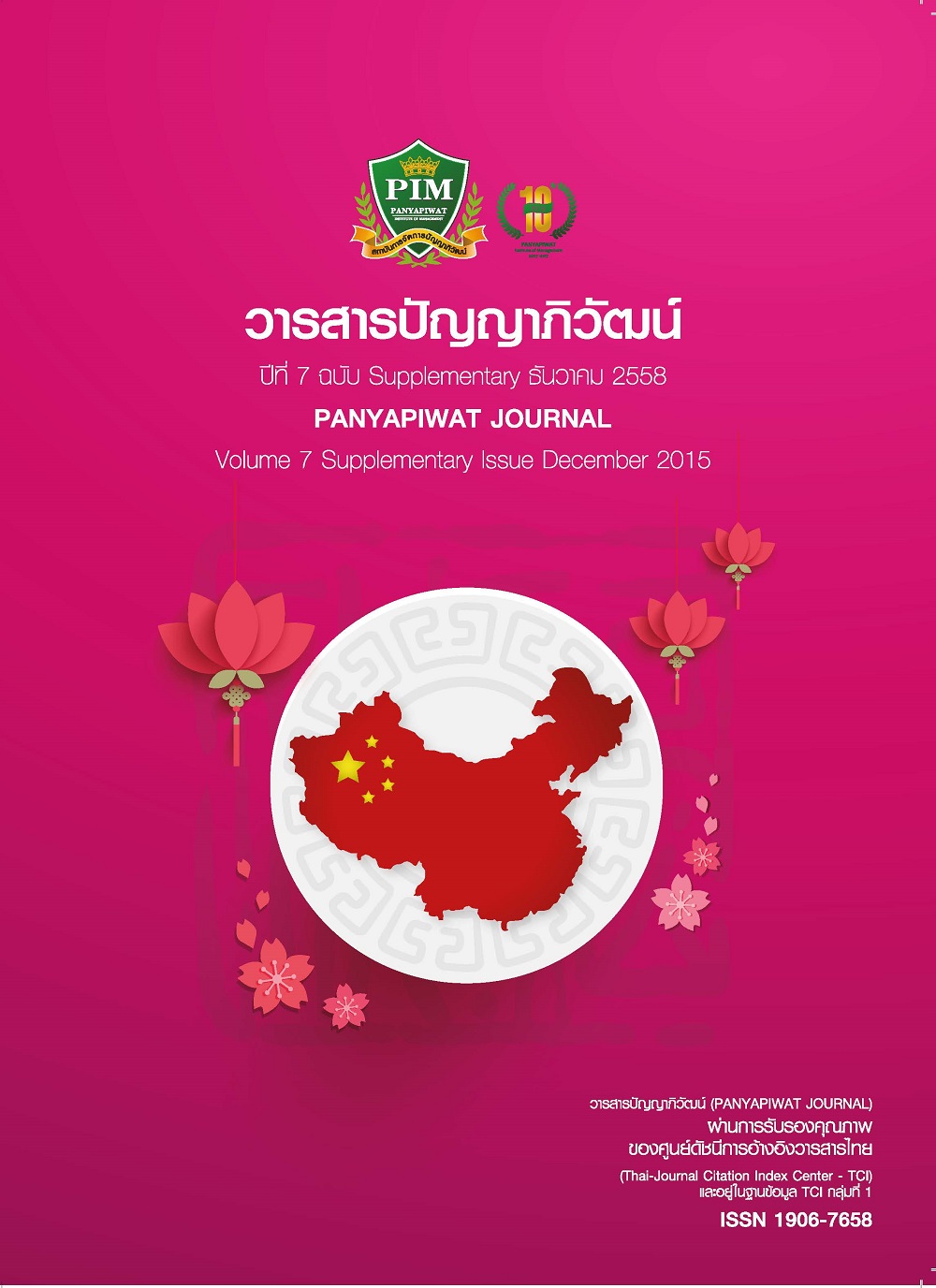泰国华人家族企业创业导向、组合创业与创业绩效的 相关性研究
Main Article Content
บทคัดย่อ
泰国华人家族企业在面对日益加剧的环境不确定性的时候,很多公司采取组合创业战略以提升企业竞争力。首先从理论上厘清与泰国华人家族企业组合创业相关的概念,归纳和总结组合创业的影响因素及其可能产生的创业绩效;其次,探讨家族企业组合创业、创业导向及创业绩效三者间的相互影响作用,深层次研究创业导向、组合创业与创业绩效的相关关系;最后,通过226份有效样本验证了泰国华人家族企业组合创业及创业导向对创业绩效的正向影响作用,并验证了组合创业在创业导向和创业绩效两者之间的中介作用。
Thai Chinese family enterprises in Thailand are facing great environment uncertainty, and many enterprises adopt portfolio entrepreneurship strategy to improve enterprise's competitiveness. Firstly, theoretically clarify the related concepts of portfolio entrepreneurship of Thai Chinese family enterprises, introduce and summarize the influence factors of portfolio entrepreneurship and its influence on entrepreneurial performance; Secondly, discuss the mutual influence among family enterprise portfolio entrepreneurship, entrepreneurial orientation and entrepreneurial performance, study the relationship among them deeply; Finally, by analyzing 226 effective questionnaires of Chinese family enterprises in Thailand, validate the positive effect of portfolio entrepreneurship and entrepreneurial orientation on entrepreneurial performance, and also verify that the mediating effect of portfolio entrepreneurship between the entrepreneurial orientation and entrepreneurial performance.
Article Details
“ข้าพเจ้าและผู้เขียนร่วม (ถ้ามี) ขอรับรองว่า บทความที่เสนอมานี้ยังไม่เคยได้รับการตีพิมพ์และไม่ได้อยู่ระหว่างกระบวนการพิจารณาลงตีพิมพ์ในวารสารหรือแหล่งเผยแพร่อื่นใด ข้าพเจ้าและผู้เขียนร่วมยอมรับหลักเกณฑ์การพิจารณาต้นฉบับ ทั้งยินยอมให้กองบรรณาธิการมีสิทธิ์พิจารณาและตรวจแก้ต้นฉบับได้ตามที่เห็นสมควร พร้อมนี้ขอมอบลิขสิทธิ์บทความที่ได้รับการตีพิมพ์ให้แก่สถาบันการจัดการปัญญาภิวัฒน์หากมีการฟ้องร้องเรื่องการละเมิดลิขสิทธิ์เกี่ยวกับภาพ กราฟ ข้อความส่วนใดส่วนหนึ่งและ/หรือข้อคิดเห็นที่ปรากฏในบทความข้าพเจ้าและผู้เขียนร่วมยินยอมรับผิดชอบแต่เพียงฝ่ายเดียว”
เอกสารอ้างอิง
Baron, R. M. & Kenny D. A. (1986). “The moderator2mediator variable distinction in social psychological research: Conceptual, strategic, and statistical considerations”. Journal of Personality and Social Psychology, 51(6), 1173-1182.
Birley, S. & Westhead, P. (1993). A comparison of new businesses established by 'novice' and'habitual' founders in Great Britain. International Small Business Journal, 12(1), 38-60.
Covin, J. G. & Dennis, P. S. (1989). Strategic management of small firms in hostile and benign environments. Strategic Management Journal, 10(1), 75-87.
Covin, J. G. & Dennis, P. S. (1991). A conceptual model of entrepreneurship as firm behavior. Entrepreneurship Theory and Practice, 16(1), 7-25.
Kerlinger, F. N. (1986). Foundations of Behavioral Research. (3rd ed.). Chicago: Holt, Rinehart and Winston.
Lee, C., Lee, K. & Pennings, J. M. (2001). Internal capabilities, external networks, and Performance:
A study on technology-based ventures. Strategic Management Journal, 22(6), 615-640.
Lumpkin, G. T. & Gregory, G. D. (1996). Clarifying the entrepreneurial orientation construct and linking it to performance. Academy Management Review, 21(1), 135-172.
Miller, D. & Friesen, P. H. (1978). Archetypes of strategy formulation. Management Science, 24(9),921-933.
Miller, D. (1983). The correlates of entrepreneurship in three types of firms. Management Science,29(7), 770-791.
Rauch, A. & Frese, M. (2000). Human capital of small scale business owners and business success: A longitudinal study of moderators and mediators. Paper presented at the ICSB World Conference 2000, Brisbane.
Westhead, P. & Wright, M. (1998). Novice, portfolio, and serial founders: are they different?. Journal of Business Venturing, 13(3), 173-204.
Wiklund, J. & Shepherd, D. (2003). Knowledge-based resources, entrepreneurial orientation, and the performance of small and medium-sized businesses. Strategic Management Journal,24(13), 1307-1314.
Wiklund, J. (1999). The sustainability of the entrepreneurial Orientation - performance relationship. Entrepreneurship Theory and Practice, 24(1), 37-48.
Zahra, S. A. & Dennis M. G. (2000). International corporate entrepreneurship and firm performance:
The moderating effect of international environmental hostility. Journal of Business Venturing, 15(5-6), 469-492.
Zahra, S. A., Jennings, D. F. & Kuratko, D. F. (1999). The Antecedents and Consequences of Firm Level Entrepreneurship: The State of the Field. Entrepreneurship Theory and Practice, 24(2), 45-65.


